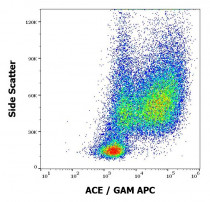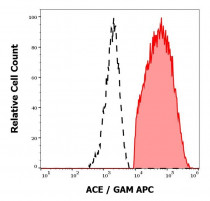ARG42429
anti-ACE antibody [5-369]
anti-ACE antibody [5-369] for Flow cytometry and Human
Overview
| Product Description | Mouse Monoclonal antibody [5-369] recognizes ACE |
|---|---|
| Tested Reactivity | Hu |
| Tested Application | FACS |
| Specificity | The mouse monoclonal antibody 5-369 recognizes an extracellular epitope of CD143, a 171 kDa type I transmembrane glycoprotein with metallopeptidase activity, expressed mainly on endothelial cells. |
| Host | Mouse |
| Clonality | Monoclonal |
| Clone | 5-369 |
| Isotype | IgG1 |
| Target Name | ACE |
| Antigen Species | Human |
| Immunogen | Dendritic cells. |
| Conjugation | Un-conjugated |
| Alternate Names | DCP1; ICH; ACE; EC 3.2.1.-; MVCD3; Angiotensin-converting enzyme; Dipeptidyl carboxypeptidase I; CD143; CD antigen CD143; EC 3.4.15.1; Kininase II; ACE1; DCP |
Application Instructions
| Application Suggestion |
|
||||
|---|---|---|---|---|---|
| Application Note | * The dilutions indicate recommended starting dilutions and the optimal dilutions or concentrations should be determined by the scientist. |
Properties
| Form | Liquid |
|---|---|
| Purification | Purification with Protein A. |
| Buffer | PBS and 15 mM Sodium azide. |
| Preservative | 15 mM Sodium azide |
| Concentration | 1 mg/ml |
| Storage Instruction | For continuous use, store undiluted antibody at 2-8°C for up to a week. For long-term storage, aliquot and store at -20°C or below. Storage in frost free freezers is not recommended. Avoid repeated freeze/thaw cycles. Suggest spin the vial prior to opening. The antibody solution should be gently mixed before use. |
| Note | For laboratory research only, not for drug, diagnostic or other use. |
Bioinformation
| Database Links | |
|---|---|
| Gene Symbol | ACE |
| Gene Full Name | angiotensin I converting enzyme |
| Background | This gene encodes an enzyme involved in catalyzing the conversion of angiotensin I into a physiologically active peptide angiotensin II. Angiotensin II is a potent vasopressor and aldosterone-stimulating peptide that controls blood pressure and fluid-electrolyte balance. This enzyme plays a key role in the renin-angiotensin system. Many studies have associated the presence or absence of a 287 bp Alu repeat element in this gene with the levels of circulating enzyme or cardiovascular pathophysiologies. Multiple alternatively spliced transcript variants encoding different isoforms have been identified, and two most abundant spliced variants encode the somatic form and the testicular form, respectively, that are equally active. [provided by RefSeq, May 2010] |
| Function | Converts angiotensin I to angiotensin II by release of the terminal His-Leu, this results in an increase of the vasoconstrictor activity of angiotensin. Also able to inactivate bradykinin, a potent vasodilator. Has also a glycosidase activity which releases GPI-anchored proteins from the membrane by cleaving the mannose linkage in the GPI moiety. [UniProt] |
| Cellular Localization | Angiotensin-converting enzyme, soluble form: Secreted. Cell membrane; Single-pass type I membrane protein. Cytoplasm. Note=Detected in both cell membrane and cytoplasm in neurons. [UniProt] |
| Calculated MW | 150 kDa |
| PTM | Phosphorylated by CK2 on Ser-1299; which allows membrane retention. [UniProt] |
Images (2) Click the Picture to Zoom In
-
ARG42429 anti-ACE antibody [5-369] FACS image
Flow Cytometry: Human GM-CSF + IL-4 stimulated peripheral blood mononuclear cells stained with ARG42429 anti-ACE antibody [5-369] at 0.6 µg/ml dilution, followed by APC-conjugated Goat anti-Mouse antibody.
-
ARG42429 anti-ACE antibody [5-369] FACS image
Flow Cytometry: Separation of Human stimulated monocytes (red-filled) from lymphocytes (black-dashed). Human GM-CSF + IL-4 stimulated peripheral blood mononuclear cells stained with ARG42429 anti-ACE antibody [5-369] at 0.6 µg/ml dilution, followed by APC-conjugated Goat anti-Mouse antibody.







